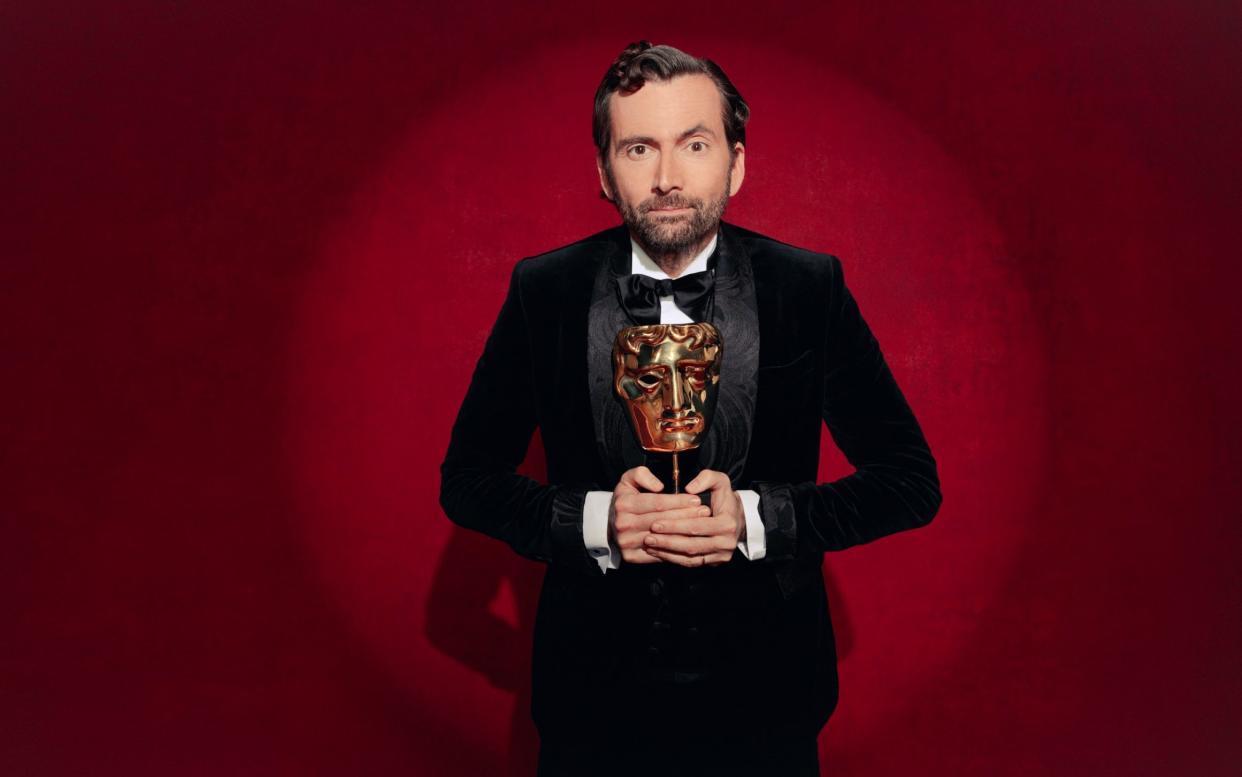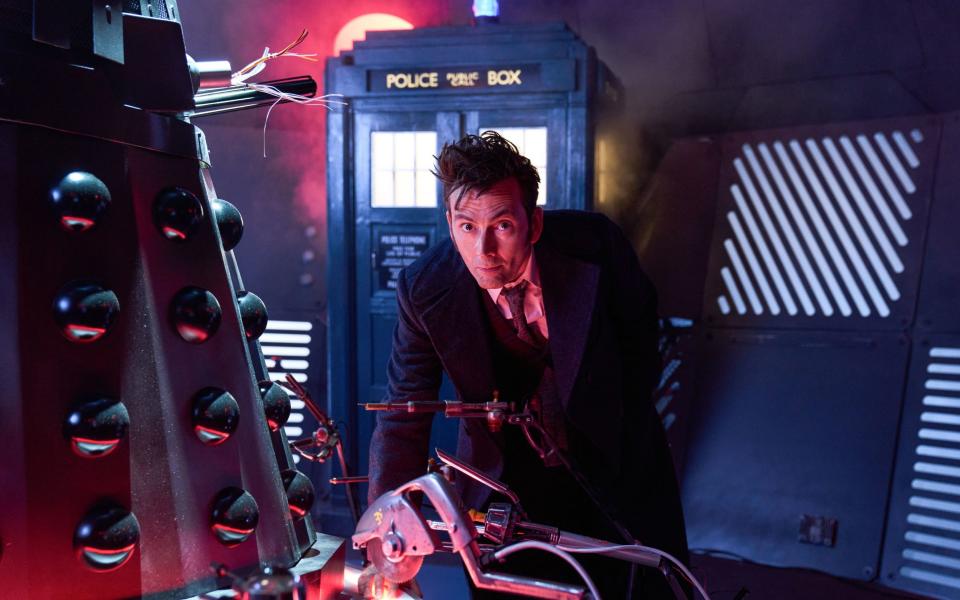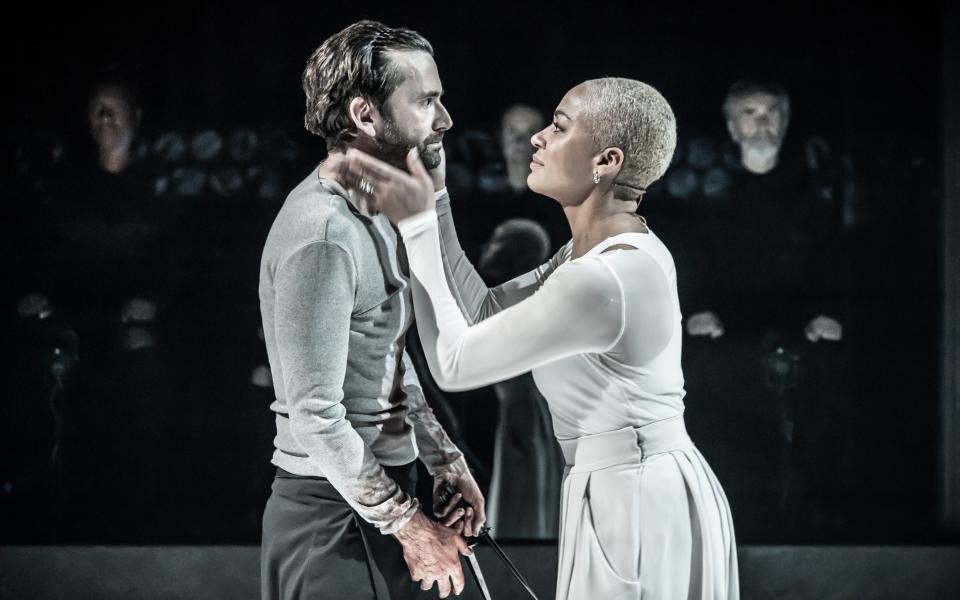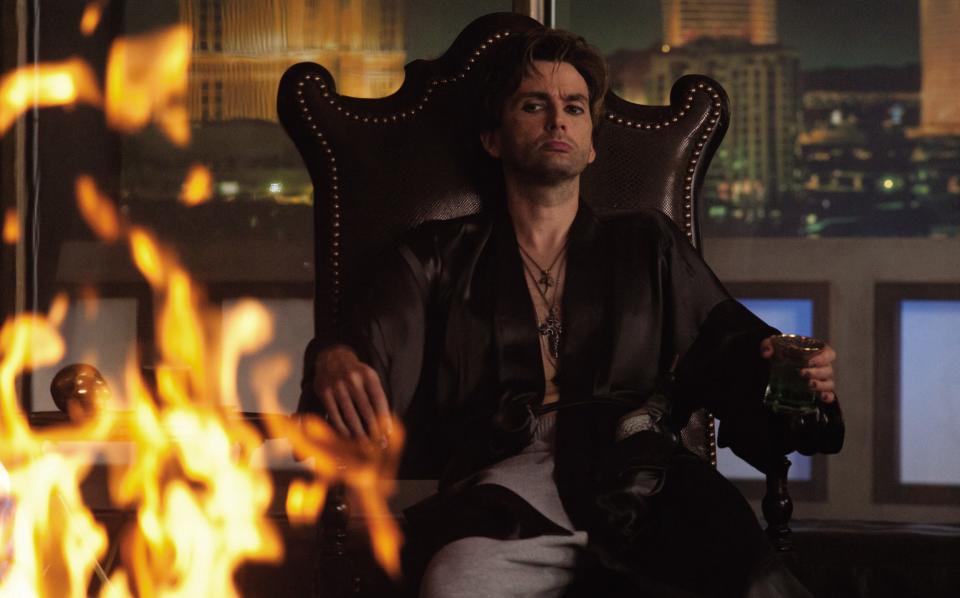Why we should all be praying for David Tennant on Bafta night

Hosting an awards ceremony is, for the most part, a poisoned chalice. Memories are still fresh of the comedian Jo Koy bombing spectacularly at the Golden Globes – it is never a great look when the host is blaming his writers mid-show for his material failing to land – and the Baftas have often struggled to find their own master (or mistress) of ceremonies who has risen to the occasion with the aplomb that the increasingly prestigious evening merits.
Over the years, the awards have been hosted by a mixture of actors, television presenters and celebrities, ranging from the inspired (Billy Connolly) to the inexplicable (Noel Edmonds). There was a lengthy period when the safe-pair-of-hands duo of Stephen Fry and Jonathan Ross kept things on an even keel as they alternated between 2002 and 2017, but since then, Bafta hosts have struggled to excel in the role.
It is a faintly thankless task that has defeated even national treasure Joanna Lumley and, last year, the great Richard E Grant – who I had high hopes for – seemed to be overwhelmed by nerves on the night. As this paper’s Michael Hogan wrote afterwards: “Combined with all the gushing speeches, it meant an overload of earnestness. Some luvvie-skewering wit would have been welcome. There was goodwill for Grant, not least when he choked up introducing the In Memoriam montage, but he can be filed alongside predecessors Joanna Lumley and Rebel Wilson as a misfire.”
Therefore, this year’s host, in the form of the much-loved David Tennant, represents perhaps the most interesting selection that the Bafta organisers have come up with since his fellow Scot Connolly hosted the awards in 1995. Tennant is one of the most popular actors in Britain, and has been for decades, combining a rare degree of versatility with enormous warmth and charm.
He has been a household name since he took over the role of the Tenth Doctor from Christopher Eccleston in 2005, and his repeated returns to the character – no doubt from a mixture of a genuine desire to do excellent work and the showrunners’ knowledge that he remains by far the most popular of the contemporary Doctor Who stars – have built up a degree of goodwill and name recognition that Tennant has parlayed into a stellar career.
Hosting the Bafta awards, then, might be a tricky proposition for anyone, even a veteran actor with decades of screen and stage experience. Tennant, however, seems to be admirably unfazed by the prospect. Although he confessed to Variety that he was “a bit bewildered” to have been asked, he also said recently that “It feels like a very privileged position to be in, but without the nervousness of wondering if you’ve won one or not. You don’t have to prepare a little hastily scribbled speech on the back of an envelope. What larks.”
Although he has admitted that his sangfroid might change on the evening itself – “I reserve the right to get back to you on the night of February 18, when I’m quivering at a corner having some sort of panic attack” – Tennant has also made the salient point that “This not being my day job is something of an advantage. There’s not that much expectation because this is not what I do. So if I do it terribly, then what’s the harm?”

Tennant will not be a Gervais-esque put-down merchant, dispensing sardonic one-liners and offering a sarcastic running commentary on the luvviness of the whole affair. (“Ricky Gervais is brilliant at what he does, but that wouldn’t be my style. I don’t think I’ve quite got that sort of approach, so I think you just have to kind of be who you are, really.”)
Nor will he be a politicised host, despite the temptation to deliver pointed asides on all manner of global goings-on. Tennant instead has promised: “Obviously, we live in a world where there’s all sorts of awful things going on and we’re all deeply moved by it. But probably the purpose of an award show at this moment in time is to have a moment away from all that.”
He is also admirably down-to-earth about the significance, or otherwise, of the night. “Award ceremonies are funny, aren’t they?” he said. “There’s so much nervous energy in the air. It’s terribly exciting to be around that. And then they go on and on and on and on forever. Can we get everyone through to the other end of it, still feeling like we’re celebrating and not desperate for their dinner?”

Tennant, though, has no need to sing for his supper, metaphorically or literally. He is coming through a remarkable purple patch that has included an acclaimed recent stint onstage at the Donmar Warehouse playing Macbeth; a triumphant return to his signature role, albeit now as the fourteenth rather than tenth Doctor, for reasons too complex to explain here; a reunion with his BFF and frequent co-star Michael Sheen in the second series of Neil Gaiman and Terry Pratchett’s metaphysical comedy Good Omens, in which he plays the devilishly charming demon Crowley. And, in the next few months, the lead role of Lord Tony Baddingham in the sure-to-be-trashy, sure-to-be-unmissable Disney+ adaptation of Jilly Cooper’s much-loved bonkbuster novel Rivals.
Even if he utterly bombs as Bafta host, it will do little to affect the immense goodwill in which he is held. The wisest decision that he ever made as an actor was to continue to alternate between lucrative screen roles and the artistic satisfaction that he has obtained from taking on often demanding Shakespearean parts. Since Doctor Who began, Tennant has played Hamlet, Richard II, Benedick in Much Ado About Nothing and Berowne in Love’s Labour’s Lost, as well as taking on challenging contemporary drama in the form of the leads in Patrick Marber’s Don Juan in Soho and CP Taylor’s Good. This has not only ensured that he’s avoided typecasting, but also that he continues to stretch himself, whether with the RSC or in the West End.
This energy, and desire to go against easy expectations, has done him exceptionally well. Over the course of his career, he has played everyone from dashing romantic heroes (including none other than Casanova, which introduced him to Doctor Who showrunner Russell T Davies) to dastardly villains. His appearance as the nefarious Kilgrave in the superhero series Jessica Jones was a salutary reminder of when Marvel’s streaming shows were appointment viewing, rather than something to be avoided at all costs.
Even if the programme in which Tennant appears is not exactly top drawer (such as the superfluous third series of his semi-improvised lockdown comedy Staged, or Steven Moffat’s bewildering Inside Man), he consistently brings his A-game to the role; it is hard to remember him being less than excellent in anything he has done, his unusually lazy performance as a misogynistic villain in the dismal St Trinian’s sequel, The Legend of Fritton’s Gold, aside.
There is, however, one small elephant in the room, and it may flap its ears on Sunday night, given the company that Tennant is keeping at the Royal Festival Hall for the ceremony. Despite being one of Britain’s most versatile and talented actors, he has never had much success in cinema, with his roles there being restricted either to voiceover roles in How To Train Your Dragon and similar family-friendly offerings, or small parts in the likes of Mary Queen of Scots (as the fiery Scottish cleric John Knox) and Harry Potter and the Goblet of Fire, as the villainous Barty Crouch Jr.
He had precisely one big Hollywood role, in the 2011 vampire comedy-thriller Fright Night as the jaded illusionist Peter Vincent – taking on a part that Roddy McDowall played in the 1985 original – and the film, although wickedly enjoyable, was no great box office hit, meaning that Tennant has yet to return to mainstream studio filmmaking.

When interviewed about it at the time, he retained his usual self-deprecation. “I’m still a bit mystified as to quite why they thought of me, above a lot of other people, but I’m thrilled that they did,” he said. “Asked how he felt of leaving Britain behind for what could well have been a star-making role had the film performed better, he replied “Nothing is that conscious with me, really. I just bumble from one thing to the next and hope things will make sense. I respond to whatever comes in that feels new or different or exciting. I think I’ve been lucky in that that’s provided a variety of different opportunities, which is all one can really hope for, I suppose.”
Given the dizzying eclecticism of work that he has taken on since then, from his decent but conflicted policeman in Broadchurch to his chillingly brilliant, Hannibal Lecter-esque Dennis Nilsen in the drama Des, it is surely a blessing that he has been able to escape from the lucrative straitjacket of unchallenging roles. Unlike some of his contemporaries.
Tennant is, of course, no stranger to picking up awards himself at ceremonies, with his own trophies including everything from Emmys to Scottish Baftas. It is, of course, possible that his much famed nonchalance will desert him while on stage and that he will be another underwhelming host, but few would bet against such a well-liked and dynamic figure making a conspicuous success of the evening.
Besides, he’s learnt a crucial lesson from Koy’s disastrous Golden Globes failure: no criticising the most beloved pop star of our time. “Don’t diss Tay Tay, I think is the lesson to be learned. I live in a house of Taylor Swift fans, so I know better.” Words to live by, and then some.
The winners of the Bafta 2024 Film Awards will be announced on February 18, broadcast on BBC One and BBC iPlayer
